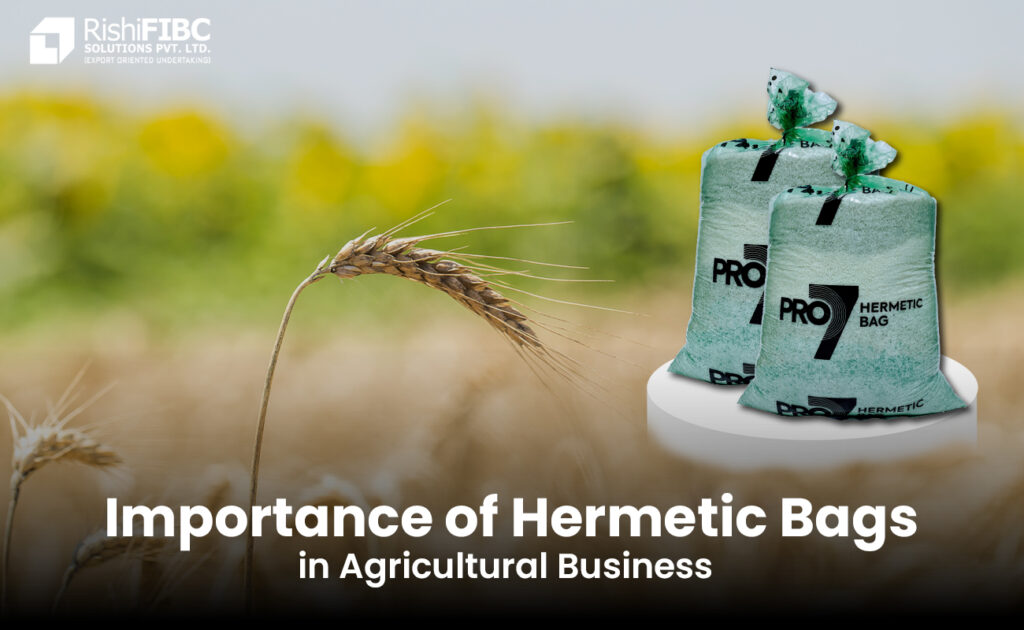Why Hermetic Bags are Important for Agricultural Business
Agriculture forms the backbone of many economies, particularly in developing countries. It encompasses a broad range of activities, including crop cultivation, livestock rearing, and agroforestry. However, one of the most crucial aspects of agriculture is the storage of grains. Proper grain storage is vital for ensuring food security, minimizing post-harvest losses, and maintaining the quality of produce until it reaches the market. This blog delves into the importance of the agriculture business, the challenges associated with grain storage, the impact of inadequate storage, and how hermetic bags are revolutionizing grain storage solutions.
Understanding the Agricultural Business Landscape: A Focus on Storage
The agricultural business encompasses a vast array of activities – from the selection and preparation of land to the planting, nurturing, and harvesting of crops. However, the journey doesn’t end there. Post-harvest management, particularly grain storage, plays a critical role in ensuring the long-term viability of these businesses.
Grains, the lifeblood of many societies, are susceptible to a variety of threats during storage. These threats not only impact the quality and nutritional value of the grains but also significantly affect the profitability of agricultural businesses.
Challenges in Grain Storage
Grain storage is fraught with numerous challenges. Some of the most common issues faced by agricultural businesses include:
- Insect Infestation: Insects like weevils and moths are relentless foes of stored grains. They burrow into the kernels, consuming and contaminating them, leading to significant product loss and potential health risks. Rodents, and other pests are also threats to stored grains.
- Fungal Growth: Moisture-laden environments create the perfect breeding ground for mold and fungus. These organisms not only spoil the grains but also produce harmful toxins, rendering them unfit for consumption.
- Temperature Fluctuations: Extreme temperature variations can affect the quality of stored grains. High temperatures can accelerate the deterioration process, while low temperatures can cause condensation, leading to moisture issues.
- Oxygen Exposure: Oxygen in the storage environment can promote the growth of aerobic microorganisms, leading to spoilage. It can also cause oxidation, affecting the nutritional quality and taste of the grains.
Impact of Inadequate Grain Storage
The lack of proper grain storage solutions can have far-reaching consequences for agricultural businesses and food security:
- Farmers: For farmers, inadequate storage can translate to significant financial losses due to spoilage, reduced quality, and lower market value of their produce.
- Consumers: Consumers face the risk of purchasing grains contaminated with insects, fungi, or toxins, jeopardizing their health and safety.
- Food Security: Widespread grain spoilage due to improper storage can contribute to food insecurity, impacting communities and exacerbating hunger.
- Post-Harvest Losses: Inadequate storage leads to significant post-harvest losses, estimated to be around 10-20% of total grain production globally. This results in economic losses for farmers and a reduction in the overall food supply.
Introducing Hermetic Bags
Hermetic bags, also known as sealed or airtight bags, are an innovative solution designed to address the challenges of grain storage. These bags create a controlled environment that protects grains from external factors such as pests, moisture, and oxygen. Rishi FIBC offers a range of high-quality hermetic storage solutions tailored to meet the needs of the agriculture industry. Here’s how:
- Pest Control: Hermetic bags are designed to be airtight, preventing pests from entering and infesting the grains. This eliminates the need for chemical fumigants, making it a safer and more sustainable option.
- Moisture and Humidity Management: The airtight nature of hermetic bags prevents moisture ingress, maintaining an optimal environment for grain storage. This helps in preventing mold growth and preserving the quality of the grains.
- Temperature Regulation: Hermetic bags provide a barrier against temperature fluctuations, reducing the risk of condensation and associated moisture problems. This ensures the grains remain dry and in good condition.
- Oxygen Reduction: By creating an airtight environment, hermetic bags limit the amount of oxygen available, inhibiting the growth of aerobic microorganisms. This helps in extending the shelf life of the grains and maintaining their nutritional quality.
- Cost-Effective: Hermetic bags are a cost-effective solution for grain storage. They reduce the need for expensive infrastructure like silos and warehouses, and their lightweight design makes them easy to transport and handle.
Hermetic bags are a game-changer in grain storage. These airtight and moisture-resistant bags create a controlled environment that protects grains from external factors. Here’s how they work:
- Airtight Seal: Hermetic bags completely isolate the contents from the external environment, preventing air, moisture, and contaminants from entering.
- Oxygen Depletion: Respiration by insects and grains inside the bag consumes oxygen, leading to an O2-deficient atmosphere. Insects cease activity, preserving grain quality.
- Carbon Dioxide Accumulation: The bag’s sealed environment accumulates carbon dioxide, further deterring pests.
Rishi FIBC’s hermetic bags provide a reliable, cost-effective, and environmentally friendly solution for agricultural businesses, helping them safeguard their harvests and enhance their profitability. By adopting hermetic storage solutions, the agriculture industry can move towards a more sustainable and secure future.







